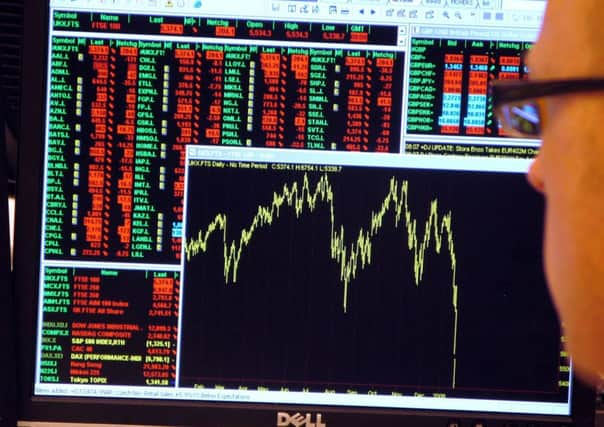Comment: Timely debunking of the FTSE-100 myth


Comprising the shares of the largest 100 companies listed on the London Stock Exchange, it has just celebrated its 30th birthday.
It began life on 3 January, 1984, at the base level of 1,000. As of Friday’s close, it stands at 6,730.7. An impressive climb, you might think, with the past 12 months seeing a gain of 14 per cent. Not quite. It hit a record peak of 6,950.6 on 30 December, 1999, and has since failed to match that level.
Advertisement
Hide AdAdvertisement
Hide AdA bad bet, then, for investors? Not quite. It does not capture the importance of income generated by equities and in particular the power of re-invested income.
However, the FTSE-100 has become the daily ready reckoner for the fortunes of millions of investors. It is nothing of the sort. It is also taken as a proxy for the behaviour of all the shares listed on the stock exchange. Here, too, it is misleading.
The truth is not as the FTSE-100 would have us believe and this index needs to be treated with caution. One distorting feature is that giant overseas mining companies are heavily represented. Companies such as Randgold Resources, Glencore Xstrata, BHP Billiton, Anglo American and Antofagasta with barely any operations or employees in the UK take a disproportionate share. The UK is not and never has been a precious metals or mining economy.
The reason so many mining companies chose to list here was to take advantage of the huge capital market that the City of London had become.
The ascendancy of the City as a global financial centre also accounts for the FTSE 100’s bias towards banks and financials. For these reasons the index, constructed simply on the basis of stock market size, cannot be considered to be representative. At least its predecessor, the FT 30 share index, attempted to be more reflective of our corporate business base.
Then there are the substantial private companies that make up a critical part of our business universe and which are absent from the London Stock Exchange.
In the years leading up to the financial crisis, many quoted household name companies disappeared into the maws of private equity. Easily available credit made it possible for a few individuals to own and control major corporations by means of debt finance, obviating the need for outside shareholders and all the tedious encumbrances of public accounts and reporting to shareholders. So much for the 1980s dream of shareholder democracy.
A better measure of how UK quoted companies are faring is the FTSE-250, which includes the next largest 250 companies after the FTSE-100. Over the past 12 months this has performed better than the Footsie, unencumbered by mining and minerals giants.
Advertisement
Hide AdAdvertisement
Hide AdHowever, there is one insight for which we owe the index. Its changing membership exposes the myth of “sustainable business” and the fashionable cult of sustainability.
Even among the corporate giants, the pace of change has been breath-taking. The giants of 1984 included Beecham Group, Burmah Oil, GEC, Ultramar and Great Universal Stores – all long gone.Anyone minded to deliver a finger-wagging lecture on the need to “build sustainable businesses” should compare the constituents of the FTSE-100 today with the starter list of 1984. Of the 100 back then, only 30 are still there and just 19 have always been in it.
What this shows us is not the sustainability or permanence of great businesses but the losing battle of seemingly robust business models against change.
The pace of this change accelerated greatly after the “Big Bang” reforms of the mid-1980s. It has been heartening to see small companies rise to the FTSE-100 Big Board – Aberdeen Asset Management, Weir Group and Tullow Oil among them.
But not all of this change was for the better. While it removed restrictive practices, it also destroyed an informal culture of supervision and surveillance and exposed the City to the giant American investment banking operations of Goldman Sachs and Lehman Brothers, sweeping away a gentlemanly capitalism. It was replaced by a culture of rapacious selfishness and greed which all but destroyed the ideals of shareholder democracy and, indeed, brought the entire financial system to its knees.
A read-through the lists of the FTSE-100 arrivals may convey an impression of wealth-cresting dynamism, but the departures give us cause for rueful reflection of a world irreparably lost.